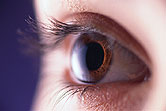
THURSDAY, June 14 (HealthDay News) — Vision impairment in young children who were born extremely premature is associated with brain damage and an eye disease called retinopathy of prematurity (ROP), a new study indicates.
It included 178 preschool children who were born extremely premature (less than 28 weeks of pregnancy) between 2004 and 2006 and a control group of 56 full-term children.
The Danish researchers found that global development deficits — intellectual disabilities that are a sign of cerebral (brain) damage — and abnormalities in an area of the retina responsible for sharp vision (the fovea) were more common among extremely premature children than in the control group, and increased with retinopathy severity.
The study authors also found that global development deficits, moderate to severe foveal abnormality and retinopathy treatment were independently associated with visual impairment.
The study was published online June 11 in the Archives of Ophthalmology.
“In conclusion, we herein demonstrate that, in Denmark, cerebral damage and ROP sequelae are independent risk factors for [vision] loss among preschool children born extremely premature and that the presence of cerebral damage is the primary risk factor of the two,” lead researcher Dr. Carina Slidsborg, from Copenhagen University Hospital, said in a journal news release.
More information
The American Academy of Pediatrics has more about premature baby health concerns.

